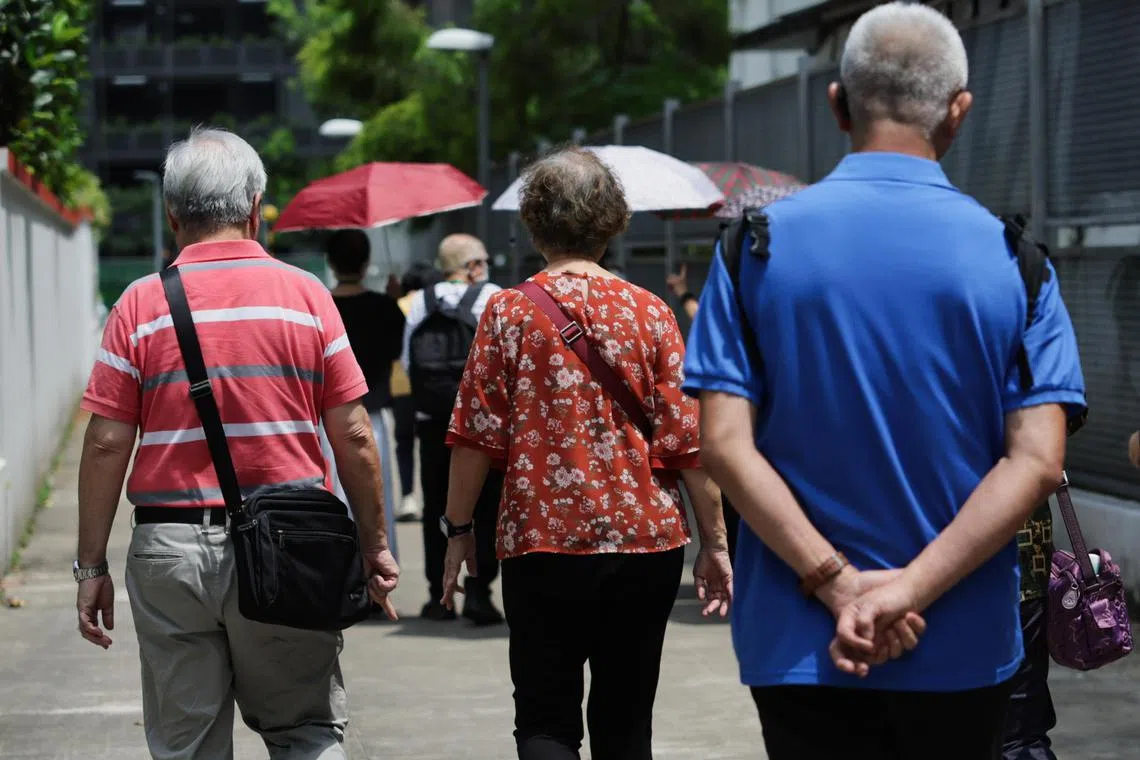Baby boomers in Singapore prioritise financial security but will spend when the need arises
Sign up now: Get ST's newsletters delivered to your inbox

Baby boomer households spent an average of US$58,468 (S$79,129) a year in 2023.
PHOTO: ST FILE
SINGAPORE – Households here headed by baby boomers generally spend less than those in other age cohorts, according to data from market research provider Euromonitor International.
But this does not indicate that baby boomers – those aged between 60 and 78 in 2024 – are stingy; they are just more prudent with their spending, boomers said.
Ms Jana Rude, senior insights manager for consumers at Euromonitor International, said boomer households spent an average of US$58,468 (S$79,129) in 2023.
This was lower than the expenditures of households led by Generation Z – aged from 12 to 27 – which spent an average of US$106,045 that year.
Households led by millennials – aged 28 to 43 – spent US$105,486, and those led by Generation X – aged 44 to 59 – spent US$92,528.
Consumer research company GWI had similar observations. Its senior trends analyst Sun Jo Ling said 60 per cent of baby boomers in Singapore prefer to choose a cheaper product, even if it is not a recognised brand.
Ms Sun added that 80 per cent of baby boomers would rather wait for a product to go on sale than buy it at full price.
Concerns over cost of living are among reasons why baby boomers are more penny-wise.
A Euromonitor International survey conducted in January found that 55.5 per cent of baby boomers here were comfortable with their financial situation in 2023, below the global average of 62 per cent.
Ms Rude added that 29.5 per cent of them had financial concerns, ranging from the high cost of living to healthcare and housing expenses.
GWI’s Ms Sun noted that baby boomers are more pessimistic about personal finances than other age cohorts, with 26 per cent believing their situation will worsen. Ms Sun added that there was a 50 per cent increase in financial pessimism among boomers from the fourth quarter of 2019 to the fourth quarter of 2023.
Such fears are compounded by baby boomers’ realisation that they live in a different world now, said Dr Kelvin Tan, head of the minor in applied ageing studies programme at the Singapore University of Social Sciences.
Their world has become a lot more uncertain, marked by rapid technological change, he added.
At the same time, Singaporeans are living longer, with 83 years being the average life expectancy at birth, up from 82.4 years in 2013.
The boomers are living longer, and if their parents are still around, they also have to take care of them as they are also living longer now, Dr Tan said, noting: “Do we have enough money? Do we need to rely on our children if we use up our money and have another 10 more years to live?”
Boomers are therefore more careful when it comes to spending, as they need to make sure they have enough money to last over their lifetime, he added.
But, like Mr Song Seng Wun, known affectionately in business circles as Uncle Song, boomers do spend when they need to.
Uncle Song will be 64 in 2024 and now works part-time as an economic adviser for CGS-CIMB Securities Singapore.
“Sometimes, I have a good meal; sometimes, I just go for a simple meal at the market. It is really what makes me satisfied for the day,” he said.
Mr Mano Sabnani, who is in his early 70s, decided a few years ago that his family did not need two cars, so he sold one.
“I was no longer working full time and do not need to drive to office. I also wanted to exercise more and use public transport,” said the former journalist.
Mr Sabnani takes care of all of his family’s expenses, including setting aside some money every month for care expenses for a brother, as well as for charity.
He said he is thankful that in his semi-retirement mode, he can still maintain his lifestyle and not have to cut back drastically.
For Mr Frederick Lim, 69, travel is his only soft spot.
The retired journalist-turned-novelist is no-frills by nature and does not go for flashy and expensive things. He sold his car a year ago and has stopped buying new clothes and other items unless he needs to replace something that has worn out.
Mr Lim spends only on necessities like groceries, utilities, transport and condominium maintenance fees now. Once in a while, he eats at a fine-dining restaurant, splurges on durians and buys books or art pieces.
But every year, Mr Lim goes for at least two long-haul holidays with his wife.
He also makes a few short trips during the year. In total, he spends about $28,000 on his travels.
Mr Lim said: “I am debt-free; no instalments to pay. I have also done retirement planning for a fairly comfortable lifestyle if I spend modestly and do not overspend.”
Euromonitor International’s Ms Rude said the top five spending categories for baby boomer households in Singapore in 2023 were housing (19 per cent of their budget); leisure and recreation (11 per cent); transport, including buying motor vehicles and transport services (10 per cent); spending on hotels and catering (10 per cent); and health goods and medical services (9 per cent).
Euromonitor has seen fast growth among boomers in expenditure on health goods and medical services and education-related expenses, with both categories expanding by 24 per cent from 2019 to 2023.
The increase in health-related spending can be attributed to heightened awareness and prioritisation of health and well-being, while the rise in expenditure on education is due to growing demand for education and skills development, noted Ms Rude.
While inflation has moderated in 2024 since hitting a high of 6.1 per cent in 2022, the cost of living remains high, with headline and core inflation expected to average between 2.5 per cent and 3.5 per cent in 2024.
The three baby boomers The Straits Times spoke to have their ways of coping.
Uncle Song said: “I will not wine and dine as often as I do.”
Mr Lim and Mr Sabnani, on the other hand, have built up a portfolio of stocks and bonds that give them passive income to fund their financial commitments.
Being financially prepared is only part of the answer to a happy and meaningful life post-retirement.
Uncle Song stays mentally occupied with his part-time work, and keeps himself fit by walking in different parks.
Mr Lim writes novels and opinion pieces to keep his mind active. He walks, runs or swims every day and plays badminton once a week.
Mr Sabnani devotes his attention to a charitable cause.
He set up a small trust in 2012 and hopes to grow it to fund the causes he believes in, such as education for children, financial literacy and protecting the environment.



